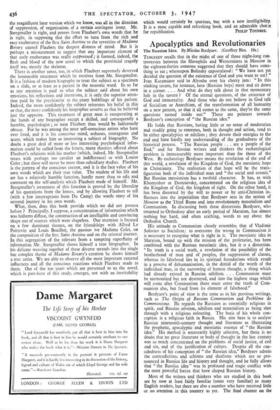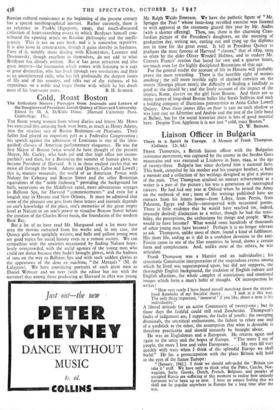Apocalyptics and Revolutionaries
The Russian Idea. %%Nicolas Berdyaev. (Geoffrey Bles. 18s.) TURGENEV recalls that in the midst of one of those night-long con. troversies between the Slavophils and Westernisers in Moscow in the eighteen-forties someone suggested that they should have some- thing to eat ; whereupon Bolinsky expostulated : " We have not yet decided the question of the existence of God and you want to eat! " Ivan Karamazov said to Alyosha over his cherry jam: " In this stinking tavern, for instance, here (Russian boys) meet and sit down in a corner. . . . And what do they talk about in that momentary halt in the tavern ? Of the eternal questions, of the existence of God and immortality. And those who do not believe in God talk of Socialism or Anarchism, of the transformation of all humanity on a new pattern, so that it all comes to the same, they're the same questions turned inside out." These are pointers towards Berdyaev's conception of "the Russian idea."
He holds that Russians, having little or no sense of moderation and readily going to extremes, both in thought and action, tend to be either apocalyptics or nihilists ; they devote their energies to the end and have hardly any understanding of the gradualness of the historical process. " The Russian people . . . are a people of the End," and for Russian writers and thinkers the eschatological problem is immeasurably more important than for those of the West. By eschatology Berdyaev means the revelation of the end of this world, a revelation of the Kingdom of God, the messianic hope in Christianity. The realisation of that hope will be the trans- figuration both of the individual man and " the social and cosmic." But Russian messianism has a twofold character. It has, as with Khomyakov or Dostoievsky, concentrated on the religious idea of the Kingdom of God, the kingdom of right. On the other hand, it has been distorted by the will to power or by anti-Christian in- fluences into the imperialism that Berdyaev sees in the notion of Moscow as the Third Rome and into revolutionary materialism and Communism. In discussing both these distortions Berdyaev, who returned to Orthodoxy after an early period of Marxism, has almost nothing but hard, and often scathing, words to say about the Orthodox Church.
His attitude to Communism closely resembles that of Vladimir Soloviev to Socialism: to overcome the wrong in Communism it is necessary to recognise what is right in it. The messianic idea in Marxism, bound up with the mission of the proletariat, has been combined with the Russian messianic idea, but it is a distortion. " Its truth is a social truth, a revelation of the possibility of the brotherhood of man and of peoples, the suppression of classes, whereas its falsehood lies in its spiritual foundations which result in a process of dehumanisation, in the denial of the worth of the individual man, in the narrowing of human thought, a thing which had already existed in Russian nihilism. . . . Communism must be surmounted but not destroyed, and into the highest stage which will come after Communism there must enter the truth of Com- munism also, but freed from its element of falsehood."
Berdyaev's point of view is the same as in his previous writings, such as The Origin of Russian Communism and Probleme de Communisme. He regards the Russians as essentially religious in spirit, and Russian atheism, nihilism and materialism as being shot through with a religious colouring. The basis of his whole con- ception is a religious faith in Russia. His aim here is to analyse Russian nineteenth-century thought and literature as illustrating the prophetic, apocalyptic and messianic essence of " the Russian idea." His method is necessarily highly selective, but there is no doubt that no great literature or body of thought in the last century was so much concentrated on the problems of social justice, of evil and sin, and of the justification of culture. Despite all the one- sidedness of his conception of " the Russian idea," Berdyaev admits the contradictions and schisms and dualisms which are so pro- nounced in Russian life and history and thought, and he fully allows that " the Russian idea " was in profound and tragic conflict with the most powerful forces that have shaped Russian history.
Most of the writers and thinkers who are studied in this book are by now at least fairly familiar (some very familiar) to many English readers, but there are also a number who have received little or no attention in this country as yet. The final chapter on the Russian cultural renaissance at the beginning of the present century has a special autobiographical interest. Rather curiously, there is no reference to Vyekhi (Signposts, 1909), that much-discussed collection of heart-searching essays to which Berdyaev himself con- tributed the opening article on Russian philosophy and the intelli- gentsia. This is not an easy book, and it is somewhat repetitive. It is also loose in construction, though it gains thereby in freshness. Parts of it, notably those dealing with Khomyakov, Leontiev and Dostoievsky, though excellent in themselves, do not add to what Berdyaev has already written. But it has great attraction and also great interest—the fascination which comes with listening to a sage of great distinction, who has lived through two revolutions and then as an unembittered exile, who has felt profoundly the deepest issues of life and of his country, and talks" out of the richness of his experience on a noble and tragic theme with which he has dwelt



































 Previous page
Previous page